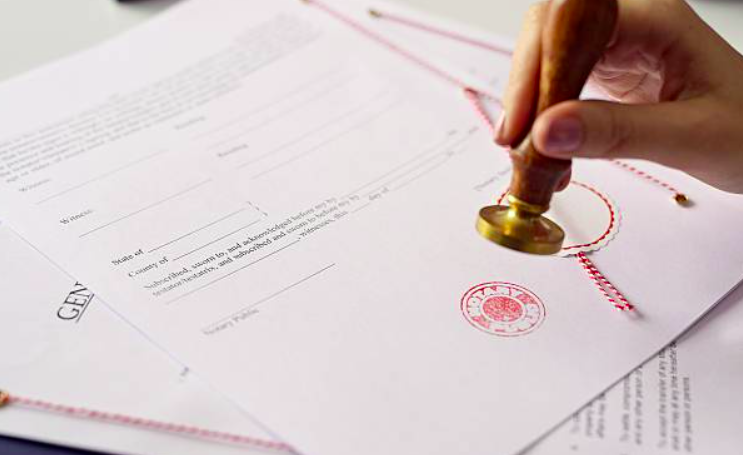
What are Notary Stamps?
Notary seals are a crucial part of the legal system, but many people are not aware of what they are or their importance. In this section, we’ll provide a clear understanding of notary seals.
Definition and Purpose of Notary Stamps
A notary stamp is a tool used by a notary public to certify or authenticate legal documents. It consists of an embossed image or a stamp that verifies the authenticity of a document. Notary seals are essential for protecting the integrity of legal proceedings and ensuring that documents are legally binding.
Historical Background of Notary Seals
The use of notary seals dates back to ancient Rome, where they were used by public officials to authenticate legal documents. The tradition continued in Europe and eventually made its way to the United States, where notary seals are still in use today.
The Difference Between a Notary Stamp and a Notary Signature
A notary signature is a handwritten signature by a notary public that verifies the authenticity of a document. In contrast, a notary seal is a stamp or an embossed image used by a notary public to provide a clear visual representation of their certification. While both are essential for legal documents, notary seals are often considered more secure and tamper-proof than a signature.
Types of Notary Seals
Notary seals come in various types, each with its advantages and disadvantages. In this section, we’ll explore the different types of notary seals.
Embossing Seals
An embossing seal is a manual tool that creates an embossed impression on a document. It’s the most traditional type of notary seal and is often considered the most secure since it can’t be easily copied. However, it can be time-consuming to use, and the resulting embossment can be difficult to see on some types of paper.
Pre-inked Stamps
Pre-inked stamps are a type of notary seal that uses ink to create a clear and legible impression on a document. They’re quicker and easier to use than embossing seals and provide a clear, sharp impression. However, they can be more susceptible to wear and tear, and the ink may bleed on some types of paper.
Self-Inking Stamps
Self-inking stamps are another type of notary seal that uses ink to create an impression. Unlike pre-inked stamps, they have an internal ink pad that can be refilled, making them a more cost-effective option. They’re also quick and easy to use and provide a clear, sharp impression. However, like pre-inked stamps, they may bleed on some types of paper.
Advantages and Disadvantages of Each Type of Notary Seal
Embossing seals are the most traditional and secure type of notary seal, but they can be time-consuming to use. Pre-inked stamps are quick and easy to use, but the ink may bleed on some types of paper. Self-inking stamps are a more cost-effective option and provide a clear impression, but they may also bleed on some types of paper.
Legal Requirements for Notary Seals
Notary seals are subject to state-specific laws and regulations that must be followed to ensure their legality. In this section, we’ll explore the legal requirements for notary seals.
State-Specific Laws and Regulations
Each state has its laws and regulations regarding notary seals. Some states require notaries to use a specific type of seal, while others allow notaries to choose their seal type. It’s essential to review the laws and regulations in your state before obtaining a notary seal to ensure compliance.
Importance of Using a Valid Notary Seal
Using a valid notary seal is crucial to the notarization process. A valid notary seal provides authentication and helps prevent fraudulent activity. It’s essential to keep your notary seal secure and prevent others from using it without your permission.
How to Obtain a Notary Seal
To obtain a notary seal, you must first become a commissioned notary public. Once you have your notary commission, you can purchase a notary seal from a reputable vendor. It’s essential to ensure that the notary seal you purchase meets the legal requirements of your state and includes all necessary information, such as your
Notary Seals and Document Authenticity
Notary seals play a crucial role in ensuring the authenticity and legality of documents. In this section, we’ll discuss how notary seals help to protect against fraud and forgery, as well as the importance of notary seals in legal proceedings.
How Notary Seals Ensure the Authenticity and Legality of Documents
Notary seals are used to authenticate the identity of the person who notarized a document and the fact that they witnessed the signing of the document. The notary’s signature, combined with the impression of the notary seal, provides proof that the document was notarized by a certified and authorized individual.
Protecting Against Fraud and Forgery with Notary Seals
Notary seals are designed to be difficult to replicate or forge, which helps to protect against fraud and forgery. The unique impression created by the notary seal is a visual representation of the notary’s identity and serves as an additional layer of security for the document.
Importance of Notary Seals in Legal Proceedings
Notary seals are a vital component of legal proceedings as they provide assurance that the notarized document is authentic and legally binding. In many legal proceedings, notarized documents are required to be submitted as evidence. The presence of a notary seal on a document helps to establish its authenticity and admissibility in court.
How to Choose the Right Notary Seal
Choosing the right notary seal is an important decision, as it can affect the legality and authenticity of your documents. In this section, we’ll discuss the factors to consider when selecting a notary seal and provide advice on how to choose the best notary seal for your needs.
Factors to Consider When Choosing a Notary Seal
- Type of Notary Seal: As discussed earlier, there are three types of notary seals – embossing seals, pre-inked stamps, and self-inking stamps. You should consider the advantages and disadvantages of each type of notary seal before making a decision.
- Design and Size: Notary seals come in different sizes and designs. Consider the amount of information you need to include on the seal and the size of the documents you will be notarizing.
- Durability: You want a notary seal that is durable and can withstand regular use. Consider the quality of materials used to make the seal and the expected lifespan.
- State Requirements: Make sure the notary seal you choose meets your state’s requirements for notary seals.
Advice on Selecting the Best Notary Seal for Your Needs
- Research: Take time to research and compare different types and brands of notary seals before making a purchase.
- Quality: Invest in a high-quality notary seal to ensure its durability and longevity.
- State Requirements: Check your state’s requirements for notary seals before making a purchase to ensure compliance.
- Personal Preference: Consider your personal preference in terms of the design, size, and style of the notary seal.
Conclusion
Choosing the right notary seal is an important decision that can impact the authenticity and legality of your documents. By considering the factors discussed above and following our advice on selecting the best notary seal for your needs, you can ensure that you choose a notary seal that meets your requirements and is compliant with your state’s regulations.
The article was created based on:
https://mystampready.com/en/blog/notary-seals-and-stamps/







